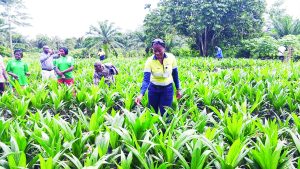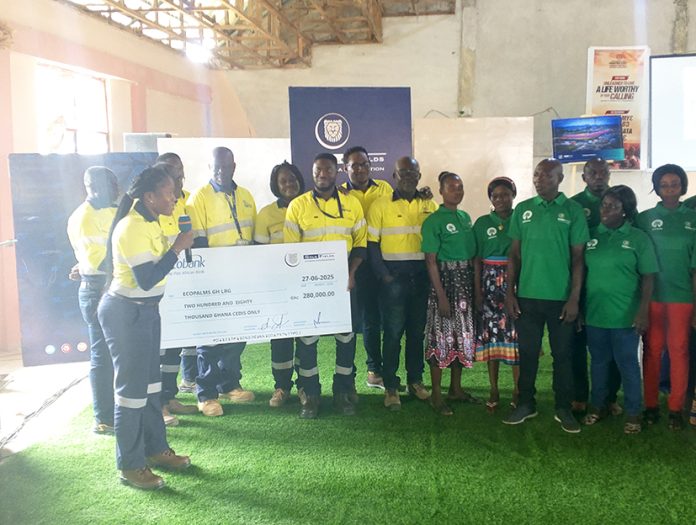An ambitious sustainable development community empowerment and economic transformation project has been launched at Pepesa, one of the host communities of Gold Fields Ghana Limited.
The project, which has been named “ECOPALMS”, a community owned oil palm seedling production enterprise, represents a tool for economic transformation in the mine host communities where about 500 farmers are expected to benefit.

With support from the people of Pepesa who gave out land for the project, an amount of GHC180, 000 investments has been made into the project by the Gold Fields Ghana Foundation (GFGF) covering land development, seed procurement and training amongst others.
About 18 community members -15 women and 3 men -make up ECOPALMS.
These members would, in turn, raise the oil palm seedlings and same supply to farmers for planting.
Currently, ECOPALMS, formed just eight months ago, has produced 24,000 oil palm seedlings, an indication that it is meant for business.
At the launch of the ambitious sustainable development project, an official of GFGF, confirmed that ECOPALMS has produced 24,000 oil palm seedlings and “we are purchasing 23,000 of them at a subsidised price of GHC12 per seedling”.
According to the GFGF Official, these same seedlings would have been sold at the market price of GHC27 and the revenue potential would more than double.“So this project is not just sustainable-it is profitable”, he said.
Beyond the numbers “this project represents something even more powerful. It is a model of economic empowerment especially for women. It is a tool for community development and most importantly, it is an alternative to illegal mining, which has harmed our environment”.
The official continued that over the next three years, the Foundation is aimed to support 500 oil palm farmers through the initiative “and ECOPALMS will remain at the heart of this effort, supplying the seedlings that will green our farmers and grow our communities.
“So today, we are not just launching a company. We are launching hope. We are planting the seed of prosperity and we are nurturing a future where development is driven by the people for the people”.
Dr. Isaac Danso, Director of Oil Palm Research Institute of Center for Scientific and Industrial Research (CSIR) disclosed that oil palm was Ghana’s second most important cash crop.
Currently, the country produces about 350,000 metric tons of oil palm annually.
However, national demand stands at 400,000 metric tons, creating a yearly shortfall of 150,000 metric tons.
To address this deficit, the government, he said established the Tree Crop Development Authority (TCDA).
This authority, he mentioned, is responsible for ensuring proper certification across the oil palm value chain—from seed production to processing.The aim is to regulate the sector, ensure quality, and ultimately close the production gap.
This, Dr Danso, noted is where ECOPALMS becomes significant because the project is focused on producing high-quality oil palm seedlings to support large-scale cultivation.
One of the major issues confronting the industry has been the distribution of adulterated or poor-quality seedlings, which affects yield and productivity.
However, ECOPALMS, he mentioned, was addressing this by sourcing seedlings from the CSIR, specifically the Oil Palm Research Institute, which produces true-to-type hybrid oil palm planting materials.
“These certified seedlings, when combined with the right agronomic practices, will help farmers achieve better yields and contribute significantly to reducing the country’s production deficit.
“As the Director of the Oil Palm Research Institute, I want to emphasise our commitment to this initiative”.
CSIR, established in 1954, Dr. Danso further mentioned has developed over 1,200 agricultural technologies.
“With this new collaboration, we hope to enter into a formal partnership or Memorandum of Understanding (MoU) with Eco Palms GH, so that they can benefit from our full range of technologies and research.
“Together, we believe this initiative can help transform oil palm cultivation in Ghana and boost national production to meet and possibly exceed demand”.
Continuing, Dr. Danso mentioned that, site selection was key in growing oil palm seedlings and quickly adding thatPepessa was first class on CSIR list in terms of site suitability.
“To have this first class come to pass, the seedlings must be a good one. And I am glad the seedlings are coming from Sumatra and we are rest assured technology went into the planting material.”
With the seedlings coming from CSIR, he said 30 tonnes of palm fruit could be realised per hectare per year.









